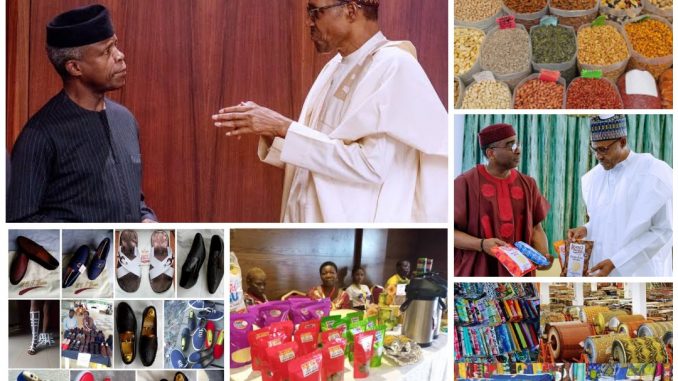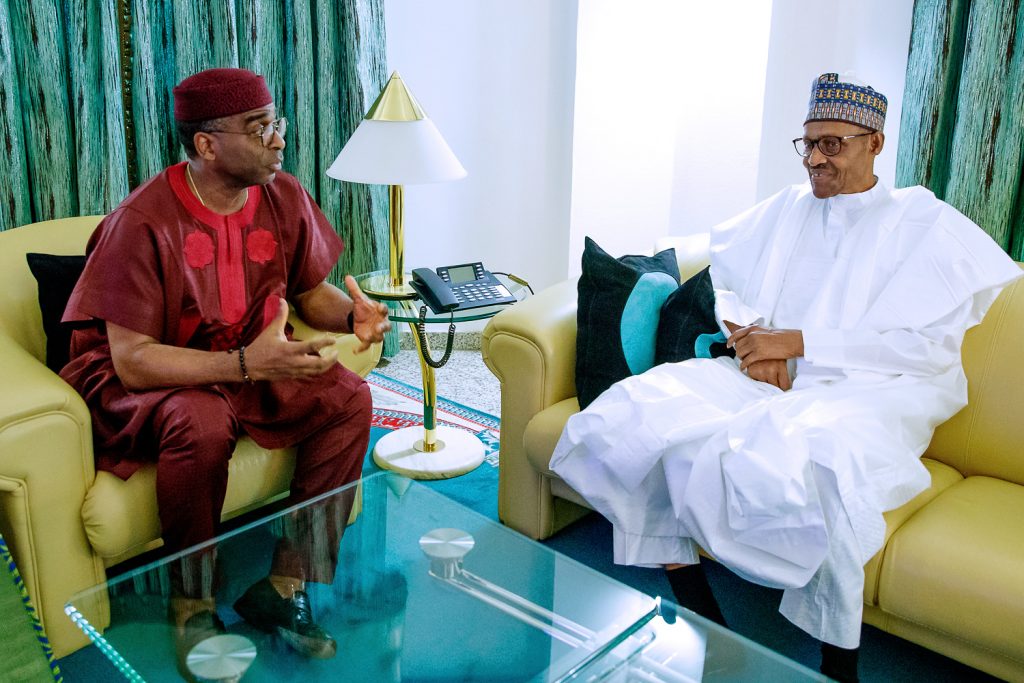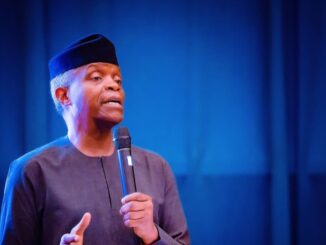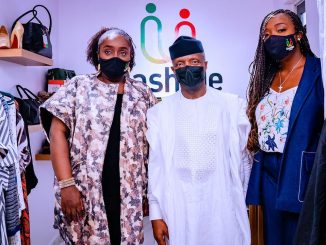
• How FG plans to boost export with N50bn ESP funding
The Nigerian government has come up with a plan to further boost the economy of Nigerians and Nigeria. It is a lifter for every Nigerian who wants to boost their naira income and foreign earnings too.
This is packaged for those who want to turn their businesses global. For a country that want to develop beyond being ordinarily called a nation, there is no better economic advantage than to create a local export advantage — and this is what one will say engendered the ned for the creation of the Export Expansion Facility Programme (EEFP), by the Buhari-Osinbajo administration, which is expected to being a quantum leap into the Nigerian economy — creating a global boom for your businesses.
It is in short, an opportunity brought to the doorsteps of Nigerians.
According to the government as recently explained by its driver, the CEO of Nigeria Export Promotion Council (NEPC), Mr Segun Awolowo, the EEFP, a series of incentives are for Nigerians to expand their business reach and become a better version of themselves in business, and its growth.
Then, looking into the total package, the NEPC, the agency of the government driving the project, said there are no restrictions on the EEFP — that it is available to help all Nigerians, saying, “if you are a company based in Nigeria, and you produce or sell anything to customers outside Nigeria, basically, you are an exporter — reach out to NEPC, you will get the needed help.”
The NEPC’s enlightenment goes thus: “If you serve export companies, or you have the capacity to do so, you are the right person or company for the EEFP’s advantage. Several benefits you stand to gain from range from logistics, to training, to capacity building, to business development consulting, and more.”
To the economy watchers, the economic advantage created and to be powered with a whooping N50 billion support, “is like the Buhari-Osinbajo administration is fast-forwarding development in Nigeria.”
As stressed by NEPC, it is good to note that, the Export Expansion Facility Programme, (EEFP) is expected to significantly raise the volume of non-oil exports in Nigeria, and it’s a spin-off of the Zero Oil Plan developed by Mr. Awolowo and approved by the President Muhammadu Buhari.
Then, apart from providing financial support for the average Nigerian exporter, the EEFP is also going to see the establishment of top-notch warehouses in the country close to airports where Nigerian goods meant for export would be packaged to global competitive standards ahead of their exportation.
ALSO READ: N75bn ESP: Survival fund beneficiaries will be evenly distributed across states —Presidency
With the official launch of the Economic Community of West African States (ECOWAS) Trade Promotion Organisations (TPO) Network being part of the measures to increase the volume of trade within the African sub-region beginning from Nigeria, the Federal Government’s plans to boost its non-oil exports will leverage on this novel initiaive.
Also, the NEPC boss, Mr Awolowo, is the inaugural president of the ECOWAS TPOs, pioneering the government’s efforts at repositioning the nation’s export through the implementation of its N50 billion Export Expansion Facility Programme (EEFP), a part of the Economic Sustainability Plan whose development and implementation is being led by Vice President Yemi Osinbajo.
Buhari congratulates Segun Awolowo as he leads ECOWAS TPOs
President Muhammadu Buhari has lauded Executive Director of Nigerian Export Promotion Council, Mr Olusegun Awolowo, on his election as President of National Trade Promotion Organizations (TPOs) from ECOWAS member States.

The President, in a statement by his spokesman, Mr Femi Adesina, believed Awolowo’s unanimous election was testament to the confidence reposed in him, and in Nigeria, by Chief Executive Officers of TPOs in West Africa.
He urged Awolowo to serve to the best of his ability, and do the country proud.
ALSO READ: Osinbajo impressed with progress of MSMEs, says FG will resolve their challenges, remove bottlenecks
Buhari noted that an ECOWAS TPO Network holds great possibilities for Nigeria and the sub-region in the areas of exchange of commercial information and business opportunities.
He expressed the hope that the domiciling of the Secretariat in Abuja would open vistas of opportunities for Nigeria.
The president wished Awolowo well in his new assignment, expressing confidence that Nigeria and ECOWAS would benefit a lot from his expertise in trade promotions.
Nigeria’s N50bn export expansion facility programme gains steam Facility
Nigeria is poised to boost its non-oil exports leveraging the Economic Community of West African States (ECOWAS) Trade Promotion Organisations (TPOs) Network.
The network, which was recently inaugurated, is geared towards increasing the volume of trade within the region.
Mr Segun Awolowo, the Executive Director of the Nigerian Export Promotion Council, NEPC, is also the inaugural President of the ECOWAS TPOs.
The NEPC has started repositioning the nation’s export through the implementation of its N50 billion Export Expansion Facility Programme (EEFP).
The EEFP is a part of the Economic Sustainability Plan (ESP) whose development and implementation is being led by Vice President Yemi Osinbajo.
EEFP is expected to significantly raise the volume of non-oil exports in Nigeria, and it is a spin-off of the Zero Oil Plan developed by NEPC and approved by the President Muhammadu Buhari.
Besides providing financial support for the average Nigerian exporter, the EEFP will engender the establishment of top-notch warehouses in the country, close to airports where Nigerian goods meant for export would be packaged to global competitive standards ahead of their exportation.
The EEFP, in line with the ESP, is focused on cushioning the effects of the COVID-19 pandemic on the non-oil export sector, thereby safeguarding jobs and creating new ones.
Earlier in March, the Minister of Industry, Trade and Investment, Chief Niyi Adebayo, inaugurated the EEFP and the first online Grant Management Portal (GMP) for non-oil exports.
While the EEFP is being implemented by the NEPC, the Federal Ministry of Industry, Trade and Investment is the supervisory body over the agency and its operations.
ALSO READ: NEPC committed to driving Nigerian women participation in non-oil sector – Segun Awolowo
The programme anticipated 500 beneficiaries since the inauguration but it has received more than 3,500 applications for the grant, out of which more than 2,000 were verified after meeting the eligibility criteria.
Federal Government officials say further details and plans on disbursement to final successful beneficiaries are being awaited.
More so, Adebayo said that aside being an intervention to save and create jobs, the programme would support resilience in shoring up foreign exchange, diversification, modernisation of Nigeria’s economy and acceleration of economic growth and economic support.
Under the EEPF, there are 16 programmes as approved in the Implementation Work plan under seven work streams.
The work streams are Capacity Building, Emergency Interventions, Export Aggregation, Export Inclusion, Export Trade facilitation, Institutional Strengthening and Market Development.
The Emergency Intervention is to support existing exporters in responding to shocks caused by COVID-19, while Market Development involves penetrating identified export markets as value chain analysis for priority products, leveraging Africa Growth and Opportunities Act (AGOA) and other trade treaties.
Considering the significant role it plays in growing the Nigerian economy, Micro, Small and Medium Enterprises (MSMEs) sector is the target group of support from the EEFP and the Export Development Fund (EDF).
At the recent inauguration of the TPO Network, Osinbajo said that there was need to expand intra-regional trade in the ECOWAS sub-region, with the opportunities presented by the African Continental Free Trade Area (AfCFTA) agreement.
On his part, Awolowo had said that the network would work towards facilitating the ease of trade for MSMEs within the ECOWAS region and Africa in general.
Creating focus for EEFP
• As FG inaugurates Steering Committee to implement N50 billion Export Expansion Facility under N2.3 trillion Economic Sustainability Plan
The Minister of Industry, Trade and Investment Otunba Niyi Adebayo on Thursday, 14 January 2021 inaugurated an 11-Man Steering Committee for the implementation of the Export Expansion Facility Programme (EEFP) under the National Economic Sustainability Plan. The EEFP aims to protect export businesses from the effects of the COVID-19 pandemic, safeguard jobs and de-risk the economy from shocks like COVID. Its primary goal is to increase Nigeria’s export capacity in the near term and its export volumes in the medium term.
Though Government will spend an estimated N2.3 trillion to fund the National Economic Sustainability Plan, the Export Expansion Facility programme will focus on driving economic growth through exports. The Minister expressed this when he stressed that the Facility is targeted at providing support to exporters particularly Micro, Small and Medium Entrepreneurs (MSMEs). In his words, “export growth is at the centre of our strategy for diversifying Nigeria’s sources of foreign exchange and reducing the vulnerability of the economy to external shocks. We have witnessed time and again, the devastating impact that events outside our control can have on our livelihoods due to our reliance on a primary source of foreign exchange”.
The Steering Committee is an integral part of the Programme and a key driver of its success. Its responsibilities are to:
• Ensure the Program is implemented in line with the Federal Government’s objectives and for the benefit of its intended beneficiaries.
• Approve the Program Implementation Plan and Budget and ensure the Program is implemented on time, on budget and in accordance with agreed priorities.
• Approve the implementation strategy of the EEF’s projects and the target beneficiaries for each project, where applicable
• Approve disbursements to beneficiaries, vendors and implementation partners
• Review the periodic performance reports and resolve implementation challenges.
Giving an overview of the EEFP, the Executive Director/CEO of Nigerian Export Promotion Council (NEPC) Mr Olusegun Awolowo commended the Federal
Government for approving the Facility pointing out that monetary stimulus package as provided in the Facility will significantly help in reviving not only the SMEs, but also big corporations in the non-oil export sector that have been negatively impacted by the COVID-19 pandemic.
This, Awolowo observed that the devastating effects of the COVID-19 pandemic on exporting businesses might be further exacerbated with the official takeoff of the African Continental Free Trade Area (AfCFTA) in January, this year adding that with the emergence of the single market, there will be attendant challenges that exporters will contend with.
He disclosed that the EEFP will execute 16 programmes as approved in the Implementation Work plan under five Workstreams namely – Capacity Building, Financing, Market Development, Infrastructure and Institutional Strengthening.
ALSO READ: We need simple commonsense approach to lift 100m Nigerians out of poverty, says Osinbajo
Awolowo explained that the application of the EEF funds fall within the context of the Export Incentives and Miscellaneous provisions Act CAP E19 Laws of the Federation, 2004.
According to him “The Act stipulates that the Funds especially (Export Development Fund and Export Adjustment Scheme Fund), shall be used to provide financial assistance to exporting companies to cover their expenses in respect of export promotion activities”.
In his remarks, the Governor of Jigawa, the Chairman of NEC Committee on Export Promotion, acknowledged the efforts of the President and the Vice President in driving the diversification of the country’s economy away from oil. He expressed confidence in the ability of the Steering Committee to drive the initiative to the desired outcome of making non-oil export a major contributor to Nigeria’s GDP.
Apart from the Chairman, other Steering Committee Members present inauguration held via Zoom are Mr Nnamdi Okonkwo (Vice-Chairman); Executive Director/Chief Executive Officer, NEPC (Member / Secretary); Excellency Abubakar Badaru (Chairman, NCEP – Member) Mansur Ahmed (President, MAN – Member); Hajiya Saratu Iya Aliyu (President, NACCIMA – Member); Mrs. Saratu Umar (Member); Mr. Suleiman Audu (Director, FMITI – Member); Mr. Kamar Bakrin (Member); Dr Ahmed Bashar (Member).



